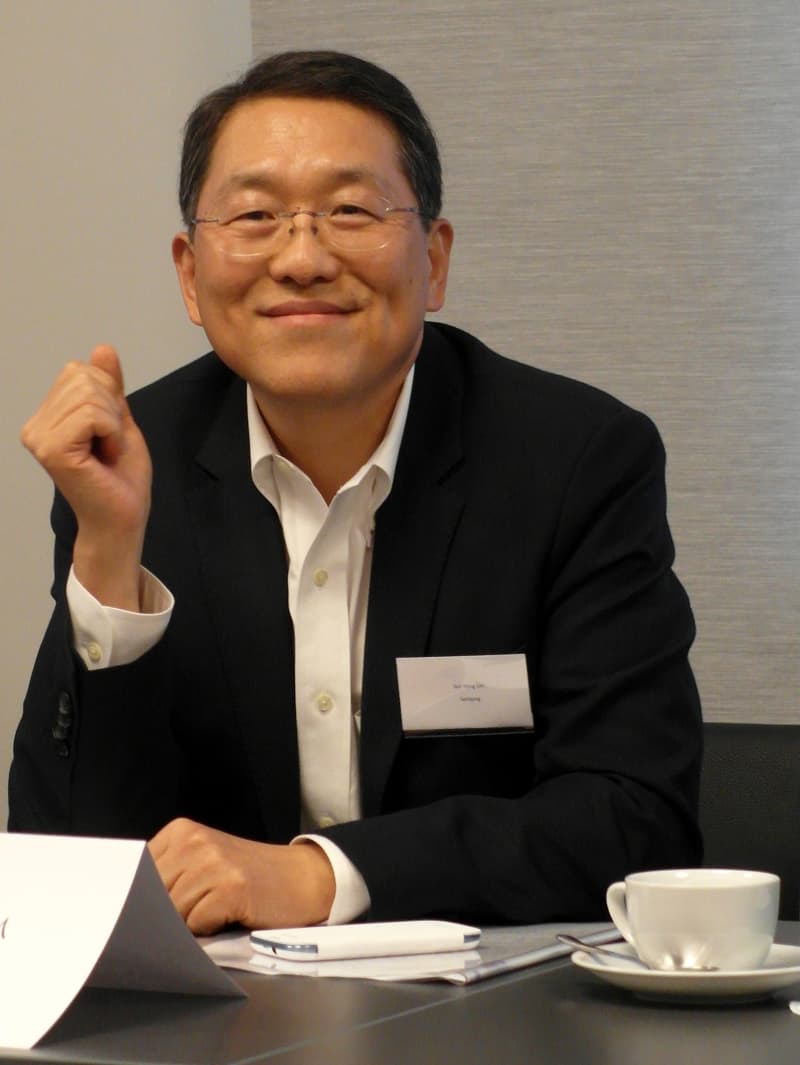Samsung Digital Imaging Sales and Marketing vice-president SH Lim at a meeting with UK journalists in Berlin; The Galaxy camera on show at IFA
Picture credits: C Cheesman:
The Samsung Galaxy camera, announced on Wednesday, features a 16.3-million-pixel 1/2.3″ BSI CMOS sensor and an Android operating system.
Due out in October, priced £399, it hooks up to the internet using 3G and 4G wireless connectivity, to create a new category of device that Samsung labels ‘smart camera’.
Asked if photographers can expect to see a larger sensor, such as an APS C-size, in future models, Samsung’s Digital Imaging Sales and Marketing vice-president SH Lim told journalists: ‘This is the first model – if there is demand we will expand.’
Lim also suggested that extending the Android system to Samsung NX compact system cameras would be a natural progression, but stressed that – for now at least – the company will focus on the success of its Galaxy compact.
Photographers can expect to see Android, 3G and 4G technology appear in Samsung’s ‘step-up or premium’ models,’ said Lim at a meeting with UK journalists in Berlin, Germany, ahead of the IFA electronics show.
‘Android is the most popular operating system at the moment…
‘Our roadmap, our plan is to evolve this smart camera concept,’ he added.
However, he explained that Samsung will continue to offer cheaper, Wi-Fi-only, technology in lower-end compacts – to satisfy consumers who want a more affordable model.
Samsung stressed that the Galaxy camera – which sports a 4.77in screen – is designed to go in a bag, not a pocket. But, there are no plans to install 3G wireless technology in cameras with smaller screens.
The larger-than-normal screen is designed to make photo editing easier, according to Samsung.
The camera’s [305g] weight and size [128.7×70.8×19.1mm] has been ‘sacrificed’ for this purpose, added a spokesman for the Galaxy camera’s planning division.
This means that all future Galaxy cameras will come with a screen that ‘will be bigger than the conventional [3in or 3.5in] display’, added Lim.
Meanwhile, he confirmed that Samsung has no plans to launch any more NX cameras this year.
Asked about the company’s future plans for DSLRs, Lim said: ‘We are still thinking – but we have always observed the market developments and, as you know, the DSLR market is very stable.’
Lim explained that, for the time being, Samsung will concentrate on CSCs, not DSLRs.
‘We expect the [DSLR] market will not grow that much compared with compact system cameras.’
Lim did not rule out striking a future alliance with another company on DSLR development, but suggested Samsung’s relationship with DSLR partner Pentax has not been severed.
‘Every possibility is open – we work closely with other companies,’ he told Amateur Photographer (AP).
Samsung confirmed that the Galaxy camera is developed in South Korea, and assembled at a factory in China.
Lim said it took around a year to develop.
• More from this interview will appear in AP shortly








